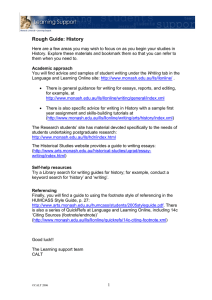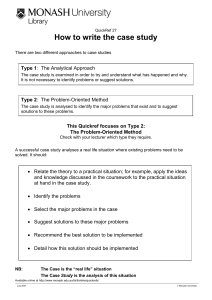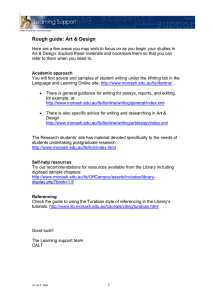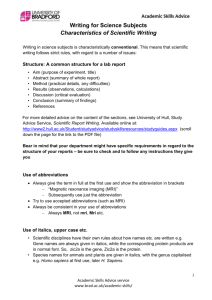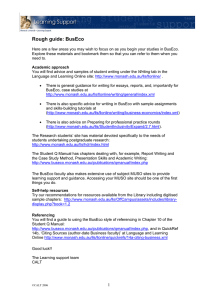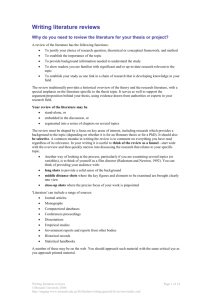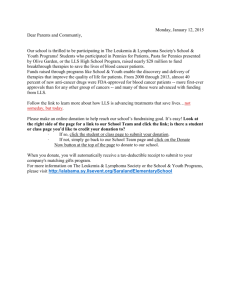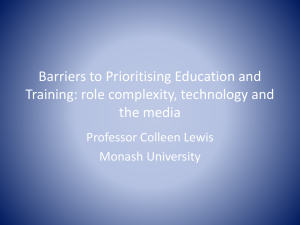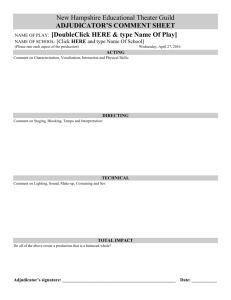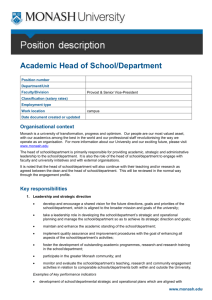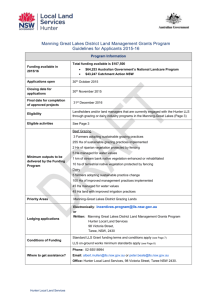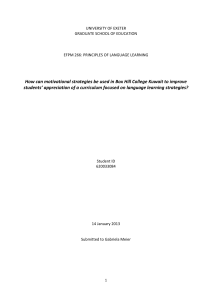How to Participate in Class
advertisement
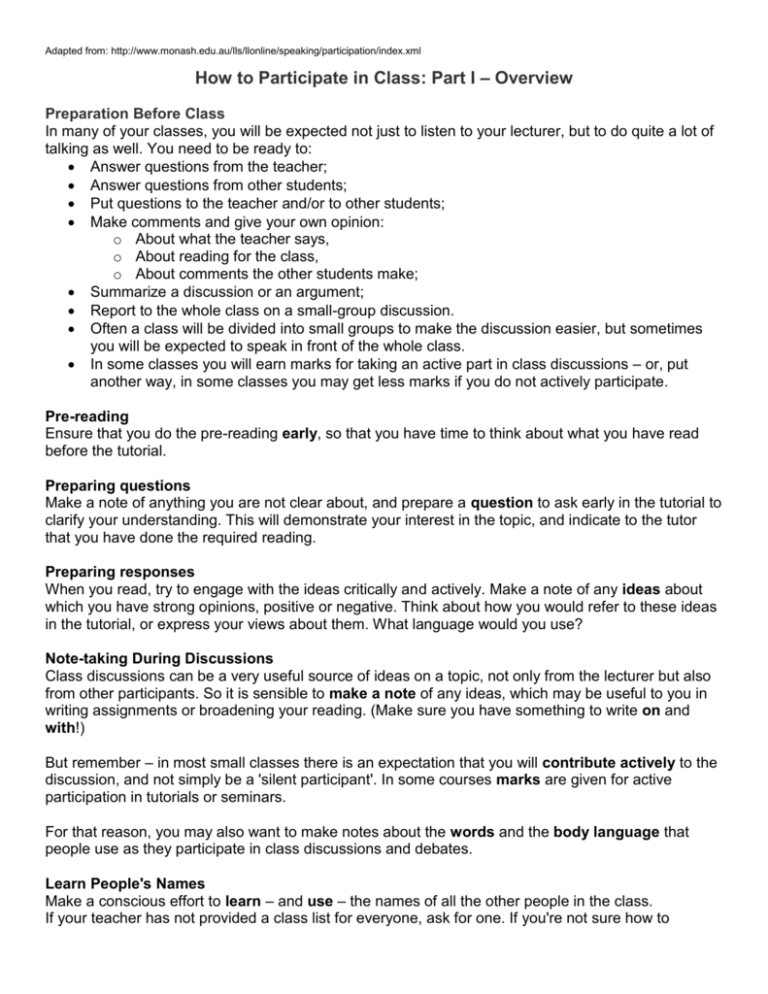
Adapted from: http://www.monash.edu.au/lls/llonline/speaking/participation/index.xml How to Participate in Class: Part I – Overview Preparation Before Class In many of your classes, you will be expected not just to listen to your lecturer, but to do quite a lot of talking as well. You need to be ready to: Answer questions from the teacher; Answer questions from other students; Put questions to the teacher and/or to other students; Make comments and give your own opinion: o About what the teacher says, o About reading for the class, o About comments the other students make; Summarize a discussion or an argument; Report to the whole class on a small-group discussion. Often a class will be divided into small groups to make the discussion easier, but sometimes you will be expected to speak in front of the whole class. In some classes you will earn marks for taking an active part in class discussions – or, put another way, in some classes you may get less marks if you do not actively participate. Pre-reading Ensure that you do the pre-reading early, so that you have time to think about what you have read before the tutorial. Preparing questions Make a note of anything you are not clear about, and prepare a question to ask early in the tutorial to clarify your understanding. This will demonstrate your interest in the topic, and indicate to the tutor that you have done the required reading. Preparing responses When you read, try to engage with the ideas critically and actively. Make a note of any ideas about which you have strong opinions, positive or negative. Think about how you would refer to these ideas in the tutorial, or express your views about them. What language would you use? Note-taking During Discussions Class discussions can be a very useful source of ideas on a topic, not only from the lecturer but also from other participants. So it is sensible to make a note of any ideas, which may be useful to you in writing assignments or broadening your reading. (Make sure you have something to write on and with!) But remember – in most small classes there is an expectation that you will contribute actively to the discussion, and not simply be a 'silent participant'. In some courses marks are given for active participation in tutorials or seminars. For that reason, you may also want to make notes about the words and the body language that people use as they participate in class discussions and debates. Learn People's Names Make a conscious effort to learn – and use – the names of all the other people in the class. If your teacher has not provided a class list for everyone, ask for one. If you're not sure how to Adapted from: http://www.monash.edu.au/lls/llonline/speaking/participation/index.xml pronounce someone's name, introduce yourself to him or her and ask. Using Visualization Every class you attend is also a preparation for the next class. At the end of a class, play it back in your mind, not just for the content and ideas, but remembering how people acted, and the sort of language they used. Then, before the next class, think about the questions and comments you have thought of, and visualize in your mind how the discussion will go. Most importantly, imagine yourself taking part: using people's names, getting their attention, asking questions, and commenting on what you've read and on what other people are saying. The more positively you do this, the more it will help you in class. Note: In a formal discussion only one person is supposed to speak at a time, and while they are speaking everyone else should be listening. We say the person who is speaking "has the floor". This expression comes from very formal meetings (e.g., in Parliament) where each person stands up (on the floor) to address the other people present, and sits down when they finish. So when you get everyone's attention and start speaking, we say you "take the floor". Body Language Watch what other people do when they are speaking, and make yourself familiar with the verbal and physical cues, which tell you that a speaker is preparing to finish speaking. These cues will help you to know when to get ready to talk or when to start an interruption. Make eye contact with the person managing the discussion, and when you have something to say, use your hand to let them know. Leaning forward in your seat can also serve as a signal that you wish to speak. Observe what body language other students in the group use to signal that they wish to speak. Adapted from: http://www.monash.edu.au/lls/llonline/speaking/participation/index.xml How to Participate in Class: Part II – What To Say What to Say Think about the language to use to participate in a discussion. “Could I ask a question?" "Excuse me, I've got a question I'd like to ask…" "I wonder if anyone could tell me…" "Can I comment at this point…" "I'd like to comment on that." "If I could make a comment…" "We haven't really considered…" "I think we need to consider…" "One thing I'd like to mention…" Interrupting Think of the discussion as a busy highway, and you as a driver waiting to enter from a side street. Often in order to force your way into the traffic, you need to pull out in front of another car – it is not always possible to simply wait for the traffic to stop to let you in. There are times when you need to break in while someone else is speaking in order to make an important point. It is not rude to do that if you use suitable language. Here are some appropriate phrases to use when you want to interrupt someone else who has the floor. Language for Interrupting "Excuse me, [NAME] – I'm sorry to interrupt you, but…" "Can I cut in here…" "Can I stop you there for a moment…" "If I could come in here…" Commenting on What a Previous Speaker Has Said Think of the discussion like a tennis match, in which you can 'return' a comment or opinion expressed by another participant. If you don't know the previous speaker's name, you can simply make eye contact and say 'you' (eg. "I think you made an interesting point when you said that…"). But in a general discussion it's better to be able to use people's names. Language for commenting on a previous speaker "I think [NAME] made an interesting point…" "I'd like to add something to what [NAME] said…" "Can I make a comment on what [NAME] said…" "Can I come back to what [NAME] said…" Adapted from: http://www.monash.edu.au/lls/llonline/speaking/participation/index.xml Agreeing or Disagreeing with a Previous Speaker When you enter a discussion, it is good to link up with what has already been said – for example, by agreeing or disagreeing with a previous speaker. Agreeing "[NAME] said that ____________. I tend to agree with that view because…" Format: AGREE + REASON "I agree with what [NAME] said about ____________. In my view…" Format: AGREE + ELABORATION "I agree. For example, if you consider the situation in my country…" Format: AGREE + EXAMPLE Disagreeing "[NAME] said that________. I disagree because…" Format: DISAGREE + REASON "[NAME] said that __________. However, in my opinion…" Format: DISAGREE + ALTERNATIVE "I can't agree with what [NAME] said about__________. In my view…" Format: DISAGREE + ALTERNATIVE Shaping the Discussion Linking the Discussion Back to the Reading Another useful participation strategy is to link the discussion back to the reading. This may be to point out a consistency or inconsistency between the discussion and the readings, or to re-focus the discussion. Rather than expressing your own view, you may be able to contribute to the discussion by expressing the view or perspective of the writers you have read on the topic. Referring to the Readings "According to [AUTHOR]…" "In her article [AUTHOR] argued that…" "We need to keep in mind [AUTHOR]'s argument that…" "How do you relate that to what [AUTHOR] said? In her article she stated that…" "[AUTHOR] suggests that__________. However, I think that…" Limiting the Scope of the Discussion or of Your Contribution Sometimes international students comment that they do not understand the context of a discussion or lack the necessary local knowledge. It can be useful to start by conceding what you do not know. In that way you can qualify your contribution and limit it to what you do know about. Comments based on your experience and knowledge can make the discussion richer and more interesting. In this way you can also control the direction of the discussion, to ensure that your Adapted from: http://www.monash.edu.au/lls/llonline/speaking/participation/index.xml perspective can be heard. How to Participate in Class: Part II – What To Say (continued) Limiting the Scope / Changing the Context "I don't know much about eating habits in Australia, but in my country…" "I don't have first-hand experience, but the impression I got from reading the textbook was that…" "I have only lived in Melbourne for a short time, but in the city I come from people shop for food every single day, and always eat fresh food, never frozen." I am not familiar with the situation in Australia, but in Malaysia HIV is a very serious health issue. There have been several government campaigns specifically targeting…" Generalizing Sometimes it is useful to broaden the scope of a discussion by generalizing. You may not be aware of the specific context being discussed, but may have a more general understanding or awareness of the topic. Acknowledging your lack of familiarity with the specific context may provide a link from the previous discussion to what you wish to say. Generalizing "Generally speaking, …" "In general terms, …" "As a rule, …" "In most cases…" Speculating: remember, there is not always a 'right' answer In an academic discussion there is often not a 'right' or 'wrong' answer. Rather, there is an expectation that a range of ideas will be discussed and that they will be supported with reasons and evidence. However, even if there is a 'right' answer, and you get it wrong, the lecturer or tutor will still appreciate your effort in contributing to the discussion. There are phrases you can use to show that you are speculating or guessing – that is, that you are not certain, but are suggesting a possible explanation. Acknowledging lack of familiarity "I am not familiar with that particular case, but…" "I am not aware of that specific example, but…" "I don't know the specifics, but…" Indicating speculation or guessing " Perhaps the experiment failed because the temperature was not stable." " It's difficult to be sure, but there may have been problems with sterilizing the equipment." " I'm just guessing, but the patient may have misunderstood the instructions." "It could have been caused by poor communication between the doctor and the nurse." "One factor might be inadequate sterilization of the equipment." " You can't be certain, but the changes in temperature may have affected the results." Fluency and Communication Adapted from: http://www.monash.edu.au/lls/llonline/speaking/participation/index.xml Some students worry about making grammatical errors in their speech; they don't want to express their ideas unless they are confident that they can do so without making mistakes. Remember, nobody's English is perfect – not even your lecturer's (true!). The more interesting the content of what you have to say, the less people will worry about the way you say it. Expressing Confusion – Asking for a Repetition Contrary to what you might think, asking for something to be repeated can have a positive effect. It shows the lecturer or tutor that you have been listening to the discussion, and are interested. It also provides important feedback to other speakers on how effectively they are communicating their ideas. Asking for something to be repeated "I didn't understand that last point. Would you mind repeating it?" "I'm still not clear. Could you repeat that?" "Sorry, I didn't catch that clearly. Did you say______________?" "You've lost me. Do you mean that _____________?" Expect to feel nervous! It is perfectly normal to feel nervous when asking a question or engaging in discussion for the first time – particularly if you are expressing yourself in a foreign language. Be prepared to 'have a go' – both the academic staff and your fellow students will respect you for this.
